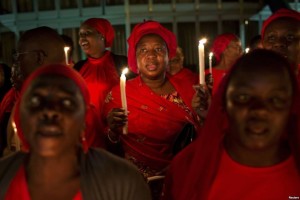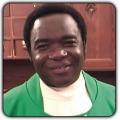
By Ann Marie Foley - 26 June, 2014

Boko Haram, the militant group that has been holding over 200 Nigerian schoolgirls captive since mid-April, is believed to be behind the kidnapping of another 60 women and girls, some as young as three, and 31 young boys.
Reports are emerging of a raid on Kummabza village in the Damboa district of Borno in which some villagers were killed, others fled and the women and children were taken away.
Some reports suggest that four were shot dead and others say as many as 30 were killed.
The kidnappings may be aimed at forcing a response to Boko Haram’s demands for the release of its fighters from jail. The militant group has stated it is willing to release the 219 schoolgirls in exchange for its members held in Nigerian jails.
The Nigerian government has said in the past that it is not willing to make a deal, however behind the scenes there have been at least some talks.

Bishop Matthew Kukah of the diocese of Sokoto, which is in ecclesiastical province of Kaduna, recently delivered a paper on Boko Haram at a conference in Sarajevo.
Bishop Kukah said that the Nigerian government “must act urgently to address the issue of corruption by ending impunity in public life and laying the foundations for good governance.”
He told CNA that Boko Haram’s prominence in Nigeria’s north came against “the backdrop of a state whose apparatus of governance had become very weak while the Muslim ulama (lawyer class) was also losing its credibility and moral authority,” so there is a “free-for-all environment.”
“Clearly, what is happening today lies in the years of corruption and mismanagement of state resources which has consigned our citizens to a life of misery and squalor,” he said.
The Bishop explained that Boko Haram’s references to “justice” and “sharia” are not only driven ideologically but also an expression of “the frustration that has spread across the country.”
The conference organised by the Oasis Foundation which fosters mutual understanding between the western/Christian and Muslim worlds, heard that since gaining independence in 1960, Nigeria has been ruled by military juntas. Its democratisation began in 1999.
 Bishop Kukah said that the best way to counter Boko Haram is to build local confidence and help local citizens to trust the government.
Bishop Kukah said that the best way to counter Boko Haram is to build local confidence and help local citizens to trust the government.
Nigeria’s population is nearly evenly divided between Muslims and Christians, with Muslims residing largely in the north, and Christians in the south.
Boko Haram is an Islamist group which launched its uprising in 2009 with the aim of imposing Sharia law on Nigeria. It has targeted security forces, politicians, Christian minorities, and moderate Muslims in the north of Nigeria.
Its attacks have killed thousands, including at least 1,600 in 2014 alone. The UN estimates that the attacks have led to more than 470,000 internally displaced persons, and some 57,000 refugees.
The kidnappings of the 219 girls (now more than 70 days ago) have attracted huge international interest especially with the ‘Bring back our Girls’ campaign on Facebook and Twitter and elsewhere on the internet.
Pope Francis tweeted “let us all join in prayer for the immediate release of the schoolgirls kidnapped in Nigeria.” There have been vigils, prayer services, protests and petitions across the globe to support the release of the girls.